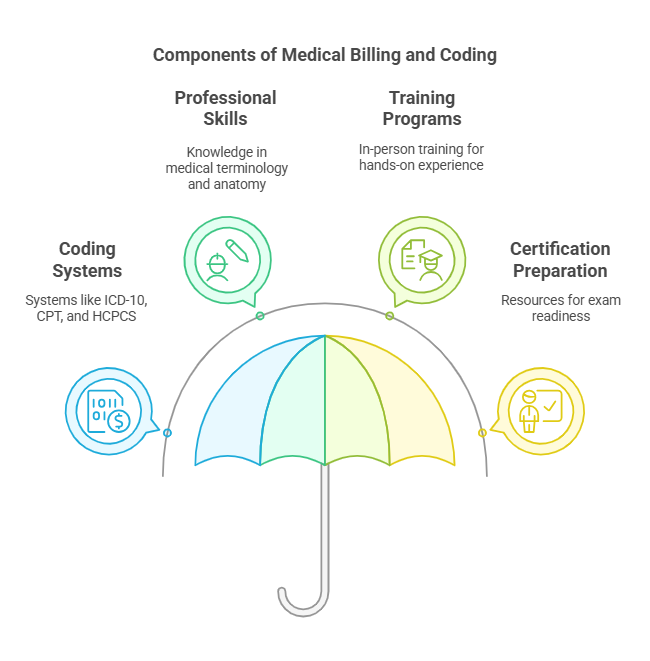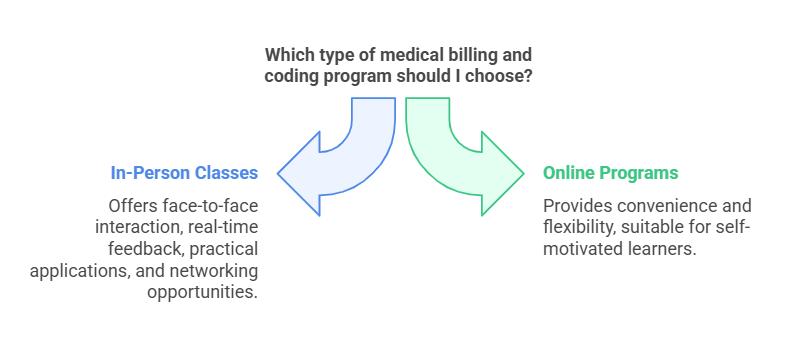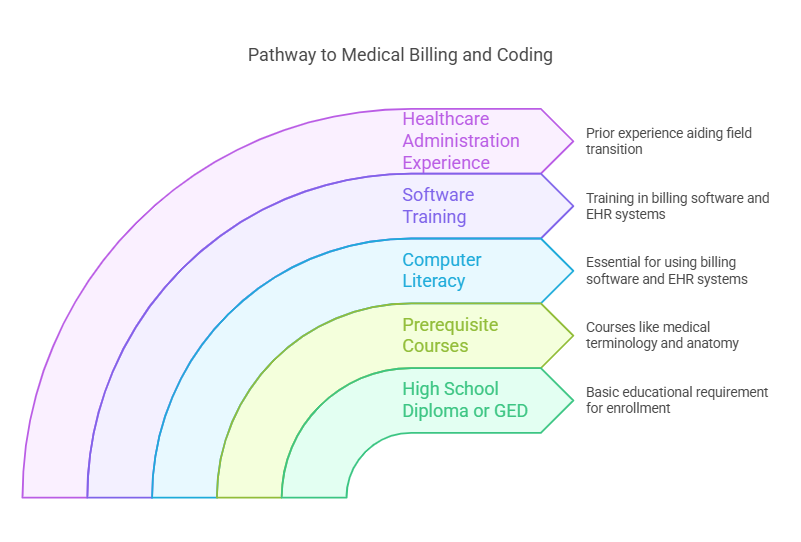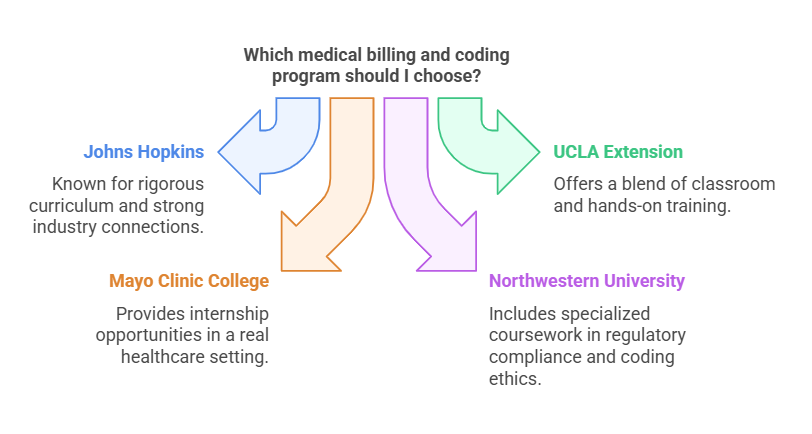Top Medical Billing and Coding In Person Classes for Career Success
Medical billing and coding is the backbone of the healthcare revenue cycle. It ensures that healthcare providers receive proper reimbursement for services rendered, allowing the system to function efficiently. As the demand for skilled professionals in this field continues to rise, in-person training has become the gold standard for mastering this career.
If you’re considering a career in medical billing and coding, choosing the right medical billing and coding certification program can set you up for long-term success. This guide explores the best in-person courses available, admission requirements, career prospects, and financial aid options while addressing common questions about certification and salaries.
Understanding Medical Billing and Coding
Medical billing and coding professionals translate patient records into standardized codes that insurance companies and healthcare providers use for billing purposes. These codes, derived from systems like ICD-10, CPT, and HCPCS, categorize diagnoses, treatments, and procedures. Without accurate coding, the entire healthcare reimbursement process would be compromised, leading to financial losses and compliance issues. Top Billing and Coding Practice Test materials can help you ace your exam by providing comprehensive knowledge and preparation in these essential coding systems.
This profession requires a strong foundation in medical terminology, anatomy, and healthcare regulations. By enrolling in an in-person training program, students gain hands-on experience, direct mentorship, and access to resources that prepare them for certification exams and real-world challenges.
Benefits of In-Person Medical Billing and Coding Classes
While online programs offer convenience, in-person classes provide unparalleled advantages, including face-to-face interactions with instructors, real-time feedback, and collaborative learning environments. These programs often include laboratory sessions, simulated case studies, and internship opportunities to reinforce theoretical knowledge with practical application. Additionally, exploring a financial aid guide for medical billing and coding can help you navigate funding options, ensuring that your educational journey is both affordable and accessible.
Another critical advantage is networking. By attending classes on campus, students can build relationships with peers, instructors, and industry professionals. Many programs also have partnerships with healthcare organizations, making it easier for students to secure job placements after graduation.
Admission Requirements for Medical Billing and Coding Programs
Most medical billing and coding programs require a high school diploma or GED for enrollment. Some institutions may also mandate prerequisite courses in medical terminology and anatomy. A strong understanding of medical language is essential, as it lays the groundwork for accurately coding diagnoses and procedures.
Basic computer literacy is also a must. Many programs incorporate training in medical billing software, electronic health records (EHR) systems, and insurance claim management tools. Students with prior experience in healthcare administration or IT may find the transition into this field smoother.
Top Medical Billing and Coding Programs in 2025
When selecting a program, accreditation is key. Institutions accredited by reputable organizations like the American Academy of Professional Coders (AAPC) or the American Health Information Management Association (AHIMA) provide curriculum that meets industry standards and prepares students for national certification exams.
Some of the best in-person medical billing and coding programs include:
Johns Hopkins School of Medicine – Known for its rigorous curriculum and strong industry connections.
University of California, Los Angeles (UCLA) Extension – Offers a blend of classroom and hands-on training.
Mayo Clinic College of Medicine & Science – Provides internship opportunities in a real healthcare setting.
Northwestern Health Sciences University – Includes specialized coursework in regulatory compliance and coding ethics.
Texas State University – Features a robust certification preparation track with high exam pass rates.
What to Expect in a Medical Billing and Coding Program
Medical billing and coding courses cover a range of subjects designed to prepare students for real-world challenges. Coursework typically includes:
Medical Terminology and Anatomy – Understanding the human body, diseases, and treatment procedures.
Coding Systems – Learning how to use ICD-10, CPT, and HCPCS codes effectively.
Billing and Reimbursement Procedures – Understanding insurance claim processes, Medicare/Medicaid policies, and compliance regulations.
Healthcare Law and Ethics – Covering HIPAA compliance, patient confidentiality, and ethical considerations.
Hands-on Training – Gaining practical experience through internships, simulations, and case studies.
Financial Aid and Scholarship Opportunities
Medical billing and coding education can be expensive, but financial aid options are available to ease the burden. Accredited programs often qualify for federal financial aid, including Pell Grants and Direct Loans. Additionally, many institutions offer scholarships based on academic merit or financial need.
Employers may also provide tuition reimbursement for employees pursuing further education in this field. If cost is a concern, check with your prospective school’s financial aid office to explore available options.
Career Prospects and Salary Expectations
Medical billing and coding specialists enjoy strong job stability. According to the U.S. Bureau of Labor Statistics (BLS), employment in this field is expected to grow significantly over the next decade due to the increasing demand for healthcare services.
Table: Highest Paying States for Medical Coders
Certified coders, such as those with a Certified Professional Coder (CPC) or Certified Billing and Coding Specialist (CBCS) credential, can command higher salaries. Experienced professionals may also transition into roles such as coding auditors, compliance officers, or even independent consultants.
Frequently Asked Questions (FAQs)
What is the best course for medical billing and coding?
The best course depends on your career goals. If you're looking for a comprehensive program with high certification pass rates, consider AAPC-accredited programs or universities like Johns Hopkins or UCLA.
What is the highest-paying medical coding and billing job?
Medical coding auditors, compliance officers, and coding managers earn the highest salaries, often exceeding $80,000 annually. Specializing in fields like inpatient coding or risk adjustment coding can also lead to higher pay.
What states pay medical coders the most?
California, New York, and Texas offer the highest salaries for medical coders, primarily due to the cost of living and the demand for healthcare professionals.
Is the CPC exam hard?
The CPC exam is challenging, but with proper preparation and training, many students pass on their first attempt. The key is to gain hands-on coding experience and practice with mock exams.
How long does it take to become a medical coder?
Most certificate programs take 6-12 months, while associate degree programs can take up to two years.
Do I need certification to work in medical billing and coding?
While certification is not always required, obtaining credentials like CPC, CCS, or CBCS increases job prospects and salary potential.
Can I work from home as a medical coder?
Yes, many healthcare facilities and insurance companies offer remote coding positions, especially for certified professionals with experience.
What is the future of medical billing and coding?
With advances in AI and automation, the role of medical coders is evolving, but demand for skilled professionals remains strong. Staying updated with industry trends and continuing education is essential for career growth.
Conclusion
Medical billing and coding is a rewarding career path that offers job stability, competitive salaries, and opportunities for growth. Choosing an accredited in-person program provides hands-on experience, industry connections, and better job prospects, whether you're pursuing roles in medical billing, coding, or related fields like a clinical trial manager. Whether you’re entering the field for the first time or seeking certification, investing in high-quality education is the first step toward a successful career in this dynamic industry.








